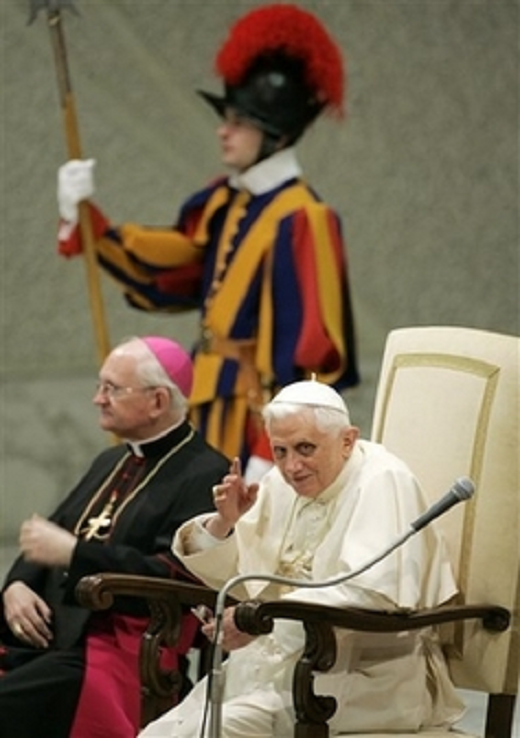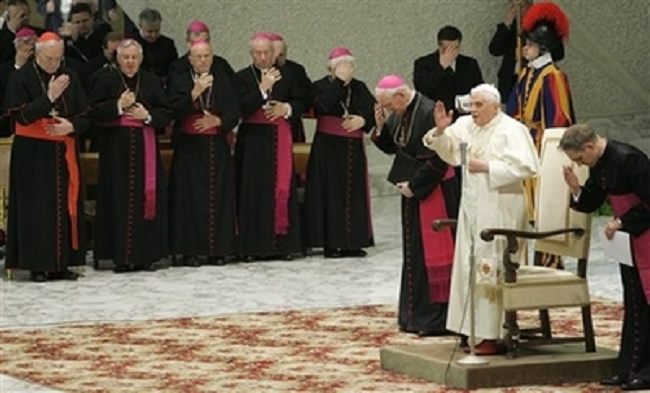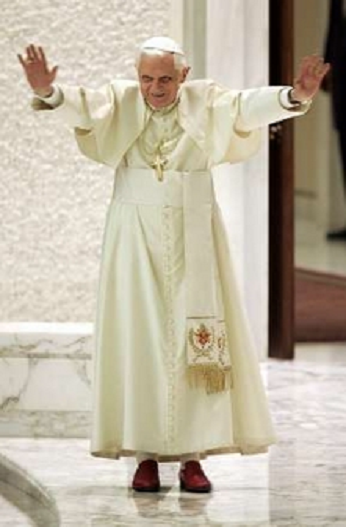
The Pope Welcomes Readers to Opinionated Catholic!!!!
Well it is Wednesday and the it is time to to see what the Holy Father is saying at his weekly audience in Rome. The Holy Father now that the Christmas Season is over is returning to the Church Fathers. We are in for a major treat. If you love St Augustine then you need to come here to keep updated. This we learn is the first in a series of talks on these very important Saint. Again thanks to the Ratzinger Forum for the pics from today's audience and the English translation. The Pope here gives us a overview of this much famous and important Saint and Father. A sort of St Aug for dummies.
Dear brothers and sisters:
After the major Christmas festivities, I wish to return to our meditations on the Fathers of the Church and speak today of the greatest Father of the Latin Church, Saint Augustine. A man of passion and faith, of supreme intelligence and tireless pastoral concern, this great saint and doctor of the Church is quite known, at least by fame, even to those who know nothing of Christianity or have not been exposed to it, because he has left a most profound imprint on the cultural life of the West and of all the world.
For his singular relevance, St. Augustine has had a vast influence. It can be said, on the one hand, that all the roads of Christian literature in Latin led to Hippo (today Annaba, on the coast of Algiers), the place where he was bishop; and on the other, that from that city of Roman Africa, where he was bishop from 395 until he died in 430, many other roads of Christianity and of Western culture itself branched out successively. Often a civilization finds a spirit so great that embodies its values and exalts its intrinsic riches, inventing ideas and forms that would nourish posterity, as Paul VI underscored once: "One can say that all the thought of antiquity converged in his work and from it came currents of thinking that pervade all the doctrinal tradition of succeeding centuries" (AAS, 62, 1970, p. 26). Augustine is also the Father of the Church who has left us the greatest number of works. His biographer Possidius said it was impossible to think that one man could write so much in one lifetime. We will speak about these different works in future meetings.
Today, our attention shall be on his life, which can be reconstructed very well from his writings, especially from his Confessions, that extraordinary spiritual autobiography, written in praise of God, which is his most famous work. Rightly so, because the Augustinian Confessions, with their attention to interiority and psychology, constituting a unique model in Western literature, is not only Western, and not even merely religious, but is also quite modern.
This attention to the spiritual life, to the mystery of the ego, the mystery of God which is hidden in that I, is extraordinary and unprecedented, and which will always remain, so to speak, a spiritual 'summit'. But to get back to his life: Augustine was born in Tagaste - in the province of Numidia, Roman Africa - on November 13, 354, to Patricius, a pagan who later became a catechumen, and Monica, a fervent Christian.
This passionate woman, venerated as a saint, exercised a very great influence on her son whom she educated in the Christian faith. Augustine received the salt that was a sign of acceptance to the catechumenate [those preparing for baptism]. He was always fascinated by the figure of Jesus. In fact, he says he had always loved Jesus, but that he grew ever farther away from the ecclesial faith, from ecclesial practice, which happens to many young people today. Augustine had a brother, Navigius, and a sister whose name we do not know and who, after she was widowed, became the head of a female monastery.
The young Augustine, with a lively intelligence, received a good education, even if he was not always an exemplary student. Nonetheless, he studied grammar well, first in his native city, then in Madaura, and from 370, he studied rhetoric in Carthage, capital of Roman Africa. He came to have perfect mastery of the Latin language, although he did not manage to gain the same mastery of Greek, and he never learned Punic, the language of his homeland. It was in Carthage that he first read Hortensius, written by Cicero but since lost, which started Augustine on his road to conversion. The Ciceronian text awakened in him a love for wisdom, as he would write, as Bishop, in Confessions: "That book truly changed my way of thinking", such that "suddenly every vain hope lost value and I desired, with incredible ardor, the immortality of wisdom" (III, 4,7).
But since he was convinced that without Jesus, one cannot say that one has really found the truth, and because in that fascinating book (Hortensius), Jesus was lacking, immediately after reading it, he started to read Scriptures, the Bible. But he was disappointed.
Not only because he found the Latin translation inadequate, but also because he found the contents themselves unsatisfactory. The Scripture narratives on wars and other human events did not reach the heights of philosophy nor have the splendor of the search for truth which he thought was appropriate.
Nevertheless, he did not wish to live without God, and so he looked for a religion that would answer his desire for truth and his desire to come close to Jesus. And so he fell into the net of the Manichaeans, who presented themselves as Christians and promised a completely rational religion. They affirmed that the world is divided into two principles, good and evil, and that this explained all the complexities of human history. Augustine liked the dualistic morality because it demanded very high morals of the 'elect'- and for those who, like him, allowed a life that was very appropriate to the times, especially for a young man. So he became a Manichaean, convinced at the time that he had found the synthesis of reason, search for truth and love of Jesus Christ. It even had a concrete advantage for his own life: belonging to the Manichaeans opened up easy career prospects.
To belong to a religion which counted with many influential personages also allowed him to continue a relationship he had started with a woman and to advance in his career. With the lady, he had a son, Adeodatus, whom he loved very much, was highly intelligent, and would later be present a Augustine's preparation for baptism near Lake Como, taking part in those Dialogues that St. Augustine has left us. The boy, unfortunately, died early. After teaching grammar for almost 20 years in his native city, Augustine returned to Carthage where he became a brilliant and celebrated teacher of rhetoric. In time, he started to grow away from Manichaeism, which disillusioned him precisely from the intellectual point of view, since it was unable to resolve his doubts.
He therefore went to Rome and later Milan, where the imperial court resided then, and where he obtained a prestigious post thanks to the interest and recommendation of the Prefect of Rome, the pagan Simmacus, who was hostile to the Bishop of Milan, Ambrose. In Milan, Augustine developed the habit of listening - initially, with the goal of enriching his own rhetorical lore - to the beautiful preachings of Bishop Ambrose, who was the imperial representative for northern Italy. The African rhetoric master was fascinated by the great Milanese prelate - not only for his rhetoric, but above all, because what he said touched him to the heart more and more. A major problem with the Old Testament - its lack of rhetorical beauty and of philosophical elevation - was resolved in Ambrose's preaching, thanks to his typological interpretation. Augustine understood then that the Old Testament is a way to Jesus Christ. So he found the key to perceive the philosophical beauty and profundity of the Old Testament and understood the unity of the mystery of Christ with history, and even that synthesis of philosophy, reason and faith in the Logos, Christ the eternal Word made flesh. Before long,
Augustine realized that the allegorical reading of Scriptures and the neo-Platonic philosophy practised by the Bishop of Milan allowed him to resolve the intellectual difficulties which, when he first approached the Biblical texts when he was younger, seemed to be insurmountable. Thus, Augustine followed up his readings of the philosophers with a rereading of Scriptures, especially the Pauline letters. His conversion to Christianity, on August 15, 386, was therefore the culmination of a long and tormented interior itinerary, about which we shall talk further in a future catechesis. The African had moved to the countryside north of Milan, near Lake Como - with his mother Monica, his son Adeodatus, and a small group of friends - to prepare himself for baptism.
At age 32, Augustine was baptized by Ambrose on April 24, 387, during the Easter vigil, at the Cathedral of Mulan. After his baptism, Augustine decided to return to Africa with his friends, with the idea of living a monastic communal life in the service of God. But at Ostia [port of Rome], while waiting to sail for Africa, his mother suddenly took ill and died shortly afterwards, breaking her son's heart. Back in his homeland, the convert settled down in Hippo to set up a monastery as planned. But in this North African coastal city, despite his resistances, he was ordained a priest in 391 and then started with some friends the monastic life he had been thinking about, dividing his time between prayer, study and preaching. All he wanted was to serve the truth, he did not feel a calling to pastoral work, but later he understood that his calling from God was to be a shepherd of others, and thus to offer the gift of truth to others. In Hippo, four years later, in 395, he was consecrated Bishop. Continuing to deepen his study of Scriptures and of the traditional Cristian texts, Augustine was an exemplary bishop in his tireless pastoral commitment.
He preached several times a week to the faithful, helped orphans and poor people, attended to the formation of the clergy and to organizing female and male monasteries. In short, the former rhetoretician affirmed himself as one of the most important Christian leaders of his time. Very active in the governance of his diocese - with remarkable civilian consequences even - during more than 35 years in the episcopate, the Bishop of Hippo, in fact, exercised a vast influence in the leadership of the Church in Roman Africa, and more generally, in the Christianity of his time, confronting religious tendencies and tenacious, disintegrative heresies like Manichaeism, Donatism and Pelagianism, which threatened Christian faith in the one God rich with mercy. And Augustine entrusted himself to God every day, to the very end of his life.
Seized with a fever, while Hippo was besieged for almost three months by barbarian invaders, the Bishop - we are told by his friend and biogrpaher Possidius in Vita Augustini - asked to have the penitential psalms written in large letters and "had the pages posted on the walls of his room so that he could read them from his sickbed, crying uninterruptedly" (31,2). Thus passed the last days in the life of Augustine, who died on August 28, 430, before he turned 76. Our next meetings will be dedicated to his works, his message and his interior development.
This is the synthesis the Pope gave in English:
Dear Brothers and Sisters,
In our weekly catechesis, we now turn to the towering figure of Saint Augustine of Hippo.
The great intellectual heritage of antiquity found expression in Augustine’s many writings, which then became a rich source of inspiration and teaching for centuries to come. Augustine’s spiritual autobiography – The Confessions – tells the story of his Christian upbringing, his secular education, his decision to devote his life to the pursuit of truth, and his eventual abandonment of the faith. Attracted at first by Manichean dualism, he gradually recovered the faith of his childhood, thanks to the prayers of his mother, Saint Monica, and the brilliant teaching of Saint Ambrose, then Bishop of Milan. The Confessions recount the tormented interior journey which led to his moral and intellectual conversion, culminating in his baptism by Ambrose. Returning to Africa to lead a monastic life, Augustine became a priest and then the Bishop of Hippo. In his thirty years as Bishop, he proved himself an exemplary pastor, an assiduous preacher and an influential champion of the Catholic faith.
In coming weeks, we will turn our attention to the writings and the thought of this great Doctor of the Church.
I am pleased to welcome the English-speaking pilgrims present at today’s Audience, especially the student groups from Australia and the United States. I greet the group of deacons from the Archdiocese of Dubuque, and I thank the choir for their praise of God in song. Upon all of you I invoke God’s abundant blessings of joy and peace.
Wednesday, January 9, 2008
The Pope Is Talking Church Fathers Again(Full Text)
Posted by
James H
at
1/09/2008 12:47:00 PM
![]()
Labels: Apologetics, Catholic, Church Fathers, Pope Benedict, vatican
Subscribe to:
Post Comments (Atom)















2 comments:
How many years of "partying" and how many years as a Christian? Lord, let me be saved, but not just yet! Was he not ELECTED...not appointed by the Bishop of Rome, his equal,if not his inferior, to be the Bishop of Hippo?
Abraxas
Oh yes St Augustine resisted the call for some time. However GOd was stubborn with him and would not leave him alone :)
As to if he saw himslef as the equal of the Bishop of Rome in all things I think we can say he did not.
Number the bishops from the See of Peter itself. And in that order of Fathers see who has succeeded whom. That is the rock against which the gates of hell do not prevail"
Augustine,Psalm against the Party of Donatus,18(A.D. 393),in GCC,51
"I am held in the communion of the Catholic Church by...and by the succession of bishops from the very seat of Peter, to whom the Lord, after His resurrection commended His sheep to be fed up to the present episcopate."
Augustine,Against the Letter of Mani,5(A.D. 395),in GCC,78
"Carthage was also near the countries over the sea, and distinguished by illustrious renown,so that it had a bishop of more than ordinary influence, who could afford to disregard a number of conspiring enemies because he saw himself joined by letters of communion to the Roman Church, in which the supremacy of an apostolic chair has always flourished"
Augustine,To Glorius et.al,Epistle 43:7(A.D. 397),in NPNF1,I:278
"If the lineal succession of bishops is to be considered with how much more benefit to the Church do we reckon from Peter himself,to whom, as bearing in a figure the whole Church, the Lord said: Upon this rock I will build my church,and the gates of hell shall not conquer it!' For to Peter succeeded Linus,Clement...Damsus,Sircius,Anastasius. In this order of sucession no Donatist bishop is too be found."
Augustine,To Generosus,Epistle 53:2(A.D. 400),in GILES,180-181
"The chair of the Roman Church, in which Peter sat, and in which Anastasius sits today."
Augustine,Against the Letters of Petillian,2:51(A.D. 402),in GCC,78
Post a Comment